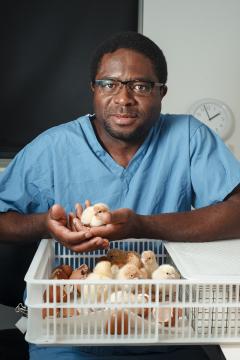Mandela award recognises livestock work
Professor Appolinaire Djikeng receives the Nelson Mandela Justice award by the UNESCO Center for Peace.

Professor Appolinaire Djikeng, Director of the Centre for Tropical Livestock Genetics and Health (CTLGH), has received the International Nelson Mandela Justice award, signed by US Senator Chris Van Hollen, in recognition of his work to make a difference in the lives of others.
Professor Djikeng has more than 20 years of experience leading multi-disciplinary, multi-institutional, and global research and development programmes focusing on agricultural development and human health.
He has been working with the UNESCO Centre for Peace for several years, which exists to build communities where people appreciate each other and support each other.
Centre for Tropical Livestock Genetics and Health
Professor Djikeng joined CTLGH at the Roslin Institute in 2017 and leads the Centre in its mission to drive and support research to develop solutions to help improve the productivity, sustainability and resilience of livestock in low- and middle- income countries.
CTLGH is a strategic alliance between the University of Edinburgh, through the Roslin Institute, Scotland’s Rural College (SRUC) and the International Livestock Research Centre (ILRI) in Kenya and Ethiopia.
The Centre has just published its strategic direction and future focus for the next 10 years.
Source of income for smallholder farmers
Professor Djikeng recently gave an online presentation during a summer camp run by the UNESCO Centre for Peace on the importance of a strong global agriculture industry and how, for millions of smallholder farmers, farming provides them with a pathway out of poverty.
I am honoured to speak at this year’s UNESCO summer camp and to receive this award. My inclination has always been towards improving the quality or the livelihoods of people who are exposed to so many externalities. Smallholder farmers in tropical countries only have livestock as their source of income, they have no safety net so are, by definition, quite vulnerable.
During my talk I spoke about the United Nations’ sustainable development goals and how CTLGH’s work contributes to them. I think it’s important for young people to know about the challenges we face now, in the hope that they will see the possibilities to improve the lives of others through agricultural development.
Agriculture has to be much better, it has to be more efficient. It has to really be a strong industry in order to meet the needs of a growing global population, because people are always going to need food.


